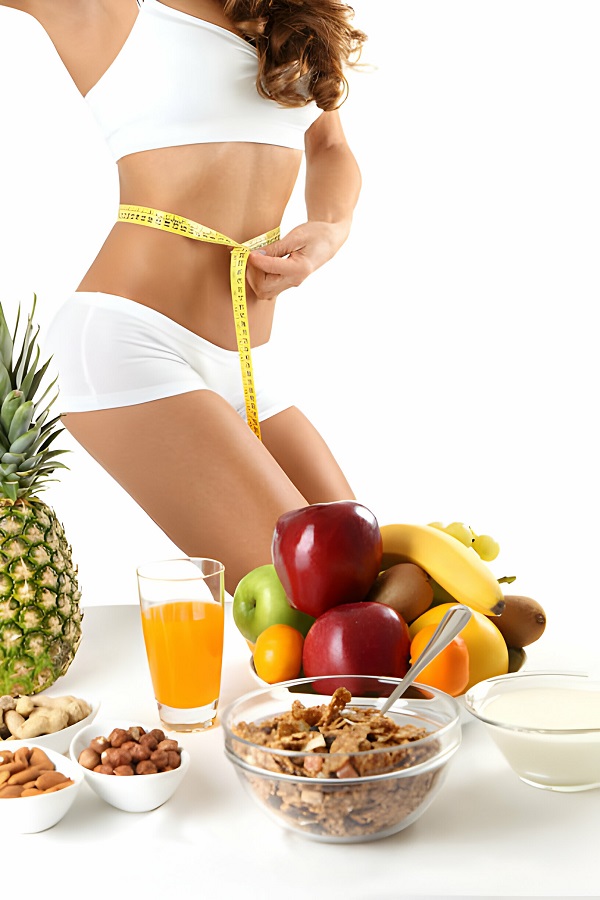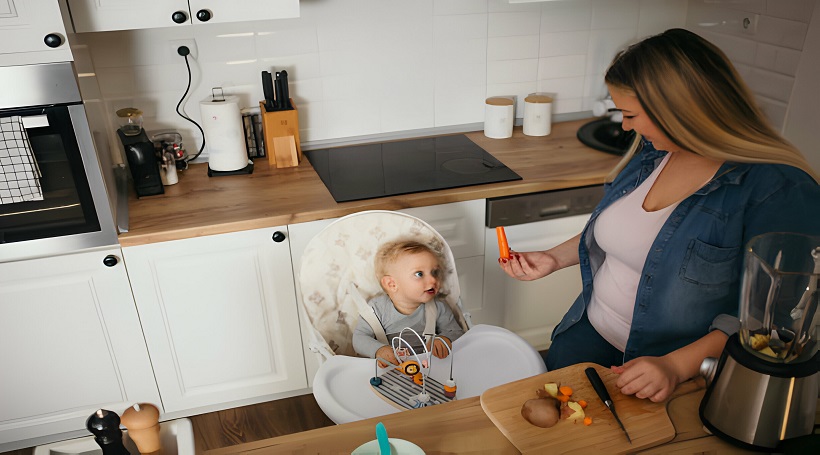Last Updated on January 1, 2025
Yes, a mother’s diet can cause baby diarrhea. Certain foods consumed by the mother can trigger diarrhea in breastfeeding babies due to their effect on the breast milk.
Mothers need to be mindful of their diet to prevent potential digestive issues in their babies. The type of food a breastfeeding mother consumes can affect the composition of her breast milk, which in turn can impact the baby’s gastrointestinal system.
Knowing which foods to avoid and making dietary adjustments can help prevent baby diarrhea. It’s recommended for mothers to consult with a healthcare professional for personalized dietary guidance to ensure the health and well-being of their babies. By paying attention to their diet, mothers can help maintain their baby’s digestive health during breastfeeding.
The Relationship Between Mother’s Diet And Baby Diarrhea

A mother’s diet can potentially lead to baby diarrhea. Certain foods or beverages consumed by the mother can pass through breast milk and irritate the baby’s digestive system, causing diarrhea. Breastfeeding mothers must maintain a balanced diet to minimize the risk of diarrhea in their infants.
Read More – Can Mother’s Diet Cause Constipation In Breastfed Baby?
When it comes to a baby’s health, every aspect is crucial, including the mother’s diet. The food a mother consumes directly affects the composition of her breast milk, which can, in turn, have an impact on her baby’s digestive system. One common concern that arises is whether a mother’s diet can cause baby diarrhea. Let’s take a closer look at the relationship between a mother’s diet and baby diarrhea, exploring the effects of a mother’s diet on breast milk composition and how it can influence the baby’s digestive system.
Effects Of Mother’s Diet On Breast Milk Composition
The composition of breast milk is greatly influenced by the mother’s diet. The food a mother eats serves as the building blocks for breast milk production, and certain substances from her diet can pass into the milk. This means that what a mother consumes directly affects the nutritional content and properties of her breast milk.
For instance, if a mother consumes spicy foods or certain gas-producing foods, the breast milk may contain components that can potentially irritate the baby’s delicate digestive system. Furthermore, certain medications or allergenic foods consumed by the mother can also be transmitted to the breast milk, potentially causing gastrointestinal disturbances in the baby.
Impact Of Breast Milk Composition On Baby’s Digestive System
The composition of breast milk plays a pivotal role in the functioning of a baby’s digestive system. Breast milk contains a rich assortment of nutrients, protective factors, and immune-boosting substances that contribute to the development and well-being of the baby.
However, when the breast milk composition is altered due to the mother’s diet, it can potentially cause digestive issues such as diarrhea in the baby. Substances that don’t agree with the baby’s digestive system or that the baby may be sensitive to can lead to digestive discomfort and loose stools.
Babies have immature digestive systems, which makes them more susceptible to changes in their diet. Therefore, if the mother’s diet consists of foods that are known to cause diarrhea or disrupt the baby’s digestion, it’s important to monitor the baby’s response and consider making adjustments to the mother’s diet.
It’s crucial to remember that every baby is unique, and what may cause diarrhea in one baby may not affect another. Monitoring the baby’s overall health, bowel movements, and any changes in behavior is essential in determining the specific impact of the mother’s diet on the baby’s digestive system. Consulting with a healthcare professional can provide personalized guidance and support in managing any potential digestive concerns.
Read More – What To Do If Mother Has No Milk?
Common Foods That May Cause Diarrhea In Babies
Babies are delicate, and their digestive systems are still developing, so mothers need to be mindful of what they eat as it can impact their baby’s health. Certain common foods can cause diarrhea in babies, leading to discomfort and potential health issues. Understanding the potential culprits can help mothers make informed decisions about their diets to promote their babies’ well-being.
Spicy And Irritating Foods
Spicy foods, such as those containing chili or hot peppers, can be harsh on a baby’s delicate stomach. These foods may irritate and lead to diarrhea in some babies. Additionally, foods with strong spices or seasonings can also contribute to digestive discomfort. Mothers should be cautious when consuming dishes with intense flavors to avoid any potential adverse effects on their babies’ digestive systems.
Foods High In Sugar Or Artificial Sweeteners
High levels of sugar or artificial sweeteners found in certain foods and beverages can disrupt a baby’s digestive balance, potentially leading to diarrhea. Consuming excessive amounts of sweets, sugary snacks, or artificially sweetened products can affect a baby’s gut health, causing discomfort and loose stools. Mothers should be mindful of their sugar intake and opt for natural sweeteners when necessary to minimize the risk of upsetting their baby’s stomach.
Dairy Products And Lactose Intolerance
Dairy products, such as milk, cheese, and yogurt, can trigger diarrhea in babies who are lactose intolerant. Lactose intolerance is common among infants, and consuming dairy-based foods can lead to digestive issues. Mothers should observe their baby’s reactions to dairy products and consult with a healthcare professional if they suspect lactose intolerance. Making dietary adjustments, such as choosing lactose-free alternatives, can help prevent diarrhea caused by lactose intolerance.
Signs And Symptoms Of Diarrhea In Infants
Diarrhea can be a common issue in infants and young children. As a parent, it’s important to recognize the signs and symptoms of diarrhea in infants. Monitoring your baby’s bowel movements and looking out for specific indications can help you provide proper care and support. Let’s take a closer look at the signs and symptoms of diarrhea in infants.
Frequent Watery Stools
One of the clear indications of diarrhea in a baby is the presence of frequent watery stools. If you notice a sudden increase in the frequency of bowel movements, especially if they are looser and more watery than usual, it could be a sign of diarrhea. Paying attention to any changes in your baby’s stool consistency and frequency is crucial in identifying diarrhea.
Abdominal Cramps And Pain
Another sign of diarrhea in infants is the presence of abdominal cramps and pain. If your baby seems uncomfortable, fussier than normal, or is displaying signs of abdominal discomfort, it could be an indication that they are experiencing diarrhea. Pay close attention to your baby’s behavior and any signs of distress or pain in the abdominal area.
Dehydration And Weight Loss
Dehydration and weight loss are serious potential consequences of diarrhea in infants. It’s important to monitor your baby’s fluid intake and look out for any signs of dehydration, such as decreased urination, dry mouth, or sunken fontanelles. Additionally, if you notice a rapid weight loss in your baby, it may be a cause for concern. Be vigilant and seek medical attention if you suspect dehydration or significant weight loss.
Read More – What To Do When You Hurt Your Mother?
How To Manage And Prevent Baby Diarrhea Through Mother’s Diet
A mother’s diet plays a crucial role in ensuring the health and well-being of her baby. It is no surprise that what a mother eats can affect the quality of breast milk and subsequently impact the baby’s digestive system. Diarrhea in babies can be difficult to deal with, but by making simple changes to the mother’s diet, it is possible to manage and prevent this uncomfortable condition. In this article, we will explore three key strategies for maintaining a balanced and varied diet, avoiding potential triggers, and incorporating probiotic foods for gut health.
Maintaining A Balanced And Varied Diet
A balanced and varied diet is essential for both the mother and the baby. It ensures that the necessary nutrients are delivered through breast milk, promoting proper digestion and overall health. Here are some tips for maintaining a balanced and varied diet:
- Include a variety of fruits and vegetables in your daily meals.
- Incorporate lean sources of protein such as chicken, fish, and legumes.
- Choose whole grains over refined grains to increase fiber intake.
- Avoid excessive consumption of processed and sugary foods.
- Stay hydrated by drinking enough water throughout the day.
- Consider taking a prenatal vitamin to fill any nutrient gaps.
Avoiding Potential Triggers
Some foods have the potential to trigger diarrhea in breastfed babies. By being aware of these triggers and avoiding them in your diet, you can help prevent diarrhea. Here are some common culprits to watch out for:
- Dairy products: In some cases, dairy can cause digestive issues in infants. If you suspect lactose intolerance or a milk allergy, try eliminating dairy from your diet for a while to see if it makes a difference.
- Spicy and gas-inducing foods: Foods like chili peppers, onions, and beans may irritate your baby’s delicate digestive system. Be mindful of the spices and gassy foods you consume.
- Caffeine and artificial sweeteners: High caffeine intake or consuming artificial sweeteners can have a laxative effect on your baby. Limit your consumption of coffee, tea, and artificially sweetened beverages.
- Highly allergenic foods: Some infants may be allergic to certain foods like nuts, eggs, or shellfish. If you notice any allergic reactions in your baby, consult a pediatrician and consider eliminating these allergenic foods from your diet.
Probiotic Foods For Gut Health
Probiotics are beneficial bacteria that promote a healthy gut. Including probiotic-rich foods in your diet can help prevent and manage baby diarrhea. Here are some examples of probiotic foods:
| FOOD | PROBIOTIC STRAINS |
|---|---|
| Yogurt | Lactobacillus acidophilus, Bifidobacterium lactis |
| Kefir | Lactobacillus kefir, Streptococcus thermophilus |
| Sauerkraut | Lactobacillus plantarum, Leuconostoc mesenteroides |
| Kombucha | Saccharomyces boulardii, Lactobacillus delbrueckii subsp. Bulgaricus |
| Miso | Bacillus subtilis, Pediococcus acidilactici |
Incorporating these foods into your diet can help promote a healthy balance of gut bacteria, reducing the risk of baby diarrhea.
When To Seek Medical Attention For Baby Diarrhea
Baby diarrhea can be a common occurrence, but it’s important for parents to know when to seek medical attention. While most cases of diarrhea can be managed at home, there are certain situations that may require a doctor’s evaluation. Here are some signs to look out for:
Persistent Or Severe Diarrhea
If your baby’s diarrhea persists for more than a few days or if it is accompanied by severe symptoms such as high fever or abdominal pain, it’s important to consult a healthcare professional. Persistent or severe diarrhea may indicate an underlying medical condition that needs treatment.
Signs Of Dehydration
Dehydration can occur quickly in infants, especially if they have been experiencing frequent diarrhea. Look out for signs such as a decrease in urine output, dry mouth, sunken fontanelle (the soft spot on the baby’s head), and irritability. If you notice these symptoms, contact your pediatrician immediately.
Unexplained Symptoms
If your baby’s diarrhea is accompanied by unexplained symptoms such as vomiting, blood in the stool, or weight loss, it’s crucial to seek medical attention. These symptoms may indicate an underlying infection or gastrointestinal condition that requires prompt evaluation and treatment.
While most cases of baby diarrhea can be managed at home with proper care and hygiene, there are certain circumstances where medical attention is necessary. By being aware of persistent or severe diarrhea, signs of dehydration, and unexplained symptoms, parents can ensure their baby receives the appropriate medical evaluation and treatment when needed.

Frequently Asked Questions On Can Mother’s Diet Cause Baby Diarrhea?
Can A Mother’s Diet Cause Baby Diarrhea?
Mother’s diet can sometimes cause baby diarrhea, especially if she consumes certain allergenic foods or drinks.
What Foods And Drinks Should A Breastfeeding Mother Avoid To Prevent Baby Diarrhea?
Breastfeeding mothers should avoid consuming foods or drinks known to cause baby diarrhea, such as dairy products, spicy foods, caffeine, and artificial sweeteners.
How Long Does It Take For A Baby’s Diarrhea To Resolve?
In most cases, baby diarrhea caused by a mother’s diet resolves within a couple of days once the offending food or drink is eliminated from the mother’s diet.
Can A Mother’s Diet Affect The Quality Of Her Breast Milk?
Yes, a mother’s diet can affect the quality of her breast milk, including its composition and potential impact on the baby’s digestive system.
What Can A Breastfeeding Mother Do To Prevent Baby Diarrhea?
To prevent baby diarrhea, breastfeeding mothers can maintain a balanced diet, stay hydrated, introduce new foods gradually, and observe their baby’s reactions to different foods.
Conclusion
It is important for breastfeeding mothers to maintain a balanced and healthy diet to avoid potential triggers for baby diarrhea. By ensuring that their own diet includes nutrient-rich foods and avoiding substances that may cause digestive issues, mothers can help protect their baby’s delicate digestive system.
Additionally, seeking advice from a healthcare provider is crucial in identifying any underlying causes or solutions to address baby’s diarrhea. Remember, a mother’s diet can play a role in her baby’s overall health and well-being.

